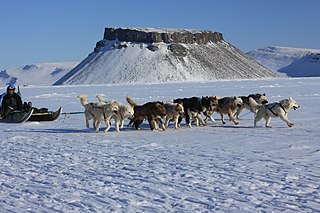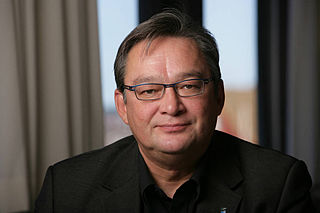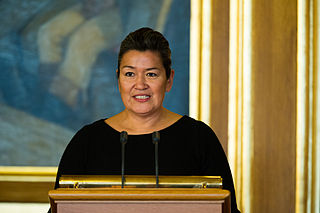Telecommunications in Greenland include radio, television, fixed and mobile telephones, and the Internet.

The flag of Greenland was designed by Greenland native Thue Christiansen. It features two equal horizontal bands of white (top) and red with a large disk slightly to the hoist side of centre. The top half of the disk is red, the bottom half is white. The entire flag measures 18 by 12 parts; each stripe measures 6 parts; the disk is 8 parts in diametre, horizontally offset by 7 parts from the hoist to the centre of the circle, and vertically centered.
Siumut is a social-democratic political party in Greenland. The party was an observer affiliate of the Socialist International. Siumut is led by the current Greenlandic Premier Kim Kielsen. Until September 2014 it was led by Aleqa Hammond, who was the first woman to lead the party.

Inuit Ataqatigiit is a democratic socialist and separatist political party in Greenland striving to make Greenland an independent state. The party, founded in 1976, was born out of the increased youth radicalism in Denmark during the 1970s. Formerly in favour of a socialist economy the party has gradually moved towards a more pragmatic approach supporting a market economy and privatisation. It believes that an independent Greenland should be competitive.

Pituffik is a former settlement in northern Greenland, located at the eastern end of Bylot Sound by a tombolo known as Uummannaq, near the current site of the American Thule Air Base. The former inhabitants were relocated to the present-day town of Qaanaaq. The relocation and the fallout from the 1968 Thule Air Base B-52 crash in the vicinity are a contentious issue in Greenland's relations with Denmark and the United States.

The term "the unity of the Realm" refers to the relationship between Denmark proper, the Faroe Islands and Greenland—three countries constituting the Kingdom of Denmark.

The Greenlandic krone was a planned currency for Greenland, plans of which were abandoned in 2009. The same name is often used for currency issued during Greenland's time as a Danish colony. The name krone is derived from the Danish krone, introduced in an 1873 currency reform that replaced Danish mark and skilling.
A consultative referendum on home rule was held in Greenland on 17 January 1979. Just over 70.1% of voters voted in favour of greater autonomy from Denmark, leading to the establishment of a Greenlandic Parliament and Greenland gaining sovereignty in areas such as education, health, fisheries and the environment.
General elections were held in Greenland on 2 June 2009. Prime Minister Hans Enoksen announced the election date on 15 April 2009, stating that he would prefer for a newly elected parliament to administer Greenland when the self-government reform takes effect on 21 June 2009. The reform gave more power to the Greenlandic parliament with decisions on most issues being devolved to the parliament but defence and foreign affairs remaining under the control of Denmark.

Jakob Edvard Kuupik Kleist is a Greenlandic politician who served as the fifth Prime Minister of Greenland between 2009 and 2013. A member of the Inuit Ataqatigiit party, he was the first Prime Minister not affiliated with Siumut.

The Greenlandic Inuit are the indigenous peoples and the most populous ethnic group in Greenland. Most speak Greenlandic and consider themselves ethnically Greenlandic. People of Greenland are citizens of Denmark.

KNI A/S or Greenland Trade is a trading conglomerate in Greenland. It is the successor to the Royal Greenland Trading Department, which controlled the government of Greenland itself from 1774 to 1908 and possessed a monopoly on Greenlandic trade from 1776 to 1950. Today, the company remains a major component of the Greenlandic economy and remains fully owned by the local government. The company is based in Sisimiut (Holsteinsborg), Greenland's second-largest city, located in mid-western Greenland's Qeqqata Municipality.

Greenlandic independence is a political ambition of some political parties, advocacy groups, and individuals of Greenland, an autonomous country of the Kingdom of Denmark, to become an independent sovereign state.

Aleqa Hammond is a Greenlandic politician and member of the Danish Folketing (parliament). Formerly the leader of the Siumut party, she became Greenland's first female Prime Minister after her party emerged as the largest parliamentary faction in the 2013 elections. In 2014 she stepped down as Prime Minister and leader of Siumut, following a case of misuse of public funds. She was expelled from Siumut on 23 August 2016 after yet another case of misuse of public funds and became an independent. On 31 March 2018 she announced that she is running in the 2018 Greenlandic parliamentary election for the Siumut breakaway Nunatta Qitornai.
Danish Greenlanders are Danish immigrants in Greenland and their descendants.

The County of Greenland was an amt (county) of Denmark, comprising Greenland and its associated islands, before home rule was granted to Greenland.




















